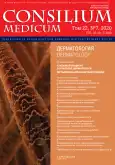Netakimab in anti-TNF-naive patients with psoriatic arthritis: subanalysis of PATERA clinical trial
- Authors: Korotaeva T.V.1, Samtsov A.V.2, Khairutdinov V.R.2, Bakulev A.L.3, Mladov V.V.4, Eremeeva A.V.4, Zinkina-Orikhan A.V.4
-
Affiliations:
- Nasonova Research Institute of Rheumatology
- Kirov Military Medical Academy
- Razumovsky Saratov State Medical University
- CJSC BIOCAD
- Issue: Vol 22, No 7 (2020)
- Pages: 14-19
- Section: Articles
- URL: https://journals.rcsi.science/2075-1753/article/view/95324
- DOI: https://doi.org/10.26442/20751753.2020.7.200319
- ID: 95324
Cite item
Full Text
Abstract
Full Text
##article.viewOnOriginalSite##About the authors
Tatiana V. Korotaeva
Nasonova Research Institute of Rheumatology
Email: tatianakorotaeva@gmail.com
д-р мед. наук, зав. лаб. спондилоартритов и псориатического артрита Moscow, Russia
Aleksei V. Samtsov
Kirov Military Medical Academyд-р мед. наук, проф., зав каф. и клиники кожных и венерических болезней Saint Petersburg, Russia
Vladislav R. Khairutdinov
Kirov Military Medical Academyд-р мед. наук, доц. каф. кожных и венерических болезней Saint Petersburg, Russia
Andrei L. Bakulev
Razumovsky Saratov State Medical Universityд-р мед. наук, проф., зав. каф. дерматовенерологии и косметологии Saratov, Russia
Vladimir V. Mladov
CJSC BIOCADменеджер по оценке технологий здравоохранения Saint Petersburg, Russia
Anna V. Eremeeva
CJSC BIOCADанд. мед. наук, вед. медицинский эксперт Saint Petersburg, Russia
Arina V. Zinkina-Orikhan
CJSC BIOCADрук. отд. клинической разработки «Аутоиммунные и орфанные заболевания» Saint Petersburg, Russia
References
- Veale DJ, Fearon U. The pathogenesis of psoriatic arthritis. Lancet 2008; 391 (10136): 2273-84. doi: 10.1016/S0140-6736(18)30830-4
- Blauvelt A, Chiricozzi A. The immunologic role of IL-17 in psoriasis and psoriatic arthritis pathogenesis. Clin Rev Allergy Immunol 2018; 55 (3): 379-90. doi: 10.1007/s12016-018-8702-3
- Кубанов А.А., Бакулев А.Л., Самцов А.В. Нетакимаб - новый ингибитор ИЛ-17а: результаты 12 недель клинического исследования III фазы BCD-085-7/PLANETA у пациентов со среднетяжелым и тяжелым вульгарным псориазом. Вестн. дерматологии и венерологии. 2019; 95 (2): 15-28. doi: 10.25208/0042-4609-2019-95-2-15-28
- Gaydukova I, Mazurov V, Erdes S et al. OP0232 Netakimab reduces the disease activity of radiographic axial spondyloarthritis. Results of ASTERA study. Ann Rheum Dis 2019; 78 (Suppl. 2): 193-4. doi: 10.1136/annrheumdis-2019-eular.6633
- Korotaeva T, Gaydukova I, Mazurov V et al. OP0226 Netakimab decreases disease activity in patients with psoriatic arthritis: results from a randomized double-blind phase 3 clinical trail (PATERA). Ann Rheum Dis 2020; 79 (Suppl. 1): 141-2. doi: 10.1136/annrheumdis-2020-eular.3469
- Gossec L, Baraliakos X, Kerschbaumer A et al. EULAR recommendations for the management of psoriatic arthritis with pharmacological therapies: 2019 update. Ann Rheum Dis 2020; 79 (6): 700-12. doi: 10.1136/annrheumdis-2020-217159
- Taylor W, Gladman D, Helliwell P et al. Classification criteria for psoriatic arthritis: development of new criteria from a large international study. Arthritis Rheum 2006; 54 (8): 2665-73. doi: 10.1002/art.21972
- ICH E2A Clinical safety data management: definitions and standards for expedited reporting. 1995.
- ICH E9 (R1) Addendum on estimands and sensitivity analysis in clinical trials to the guideline on statistical principles for clinical trials. 2019.
- Mease PJ, Kavanaugh A, Reimold A et al. Secukinumab in the treatment of psoriatic arthritis: efficacy and safety results through 3 years from the year 1 extension of the randomised phase III FUTURE 1 trial. RMD Open 2018; 4: e000723. doi: 10.1136/rmdopen-2018-000723
- McInnes IB, Mease PJ, Kirkham B et al. Secukinumab, a human anti-interleukin-17A monoclonal antibody, in patients with psoriatic arthritis (FUTURE 2): a randomised, double-blind, placebo-controlled, phase 3 trial. Lancet 2015; 386 (9999): 1137-46. doi: 10.1016/S0140-6736 (15)61134-5
- Mease PJ, van der Heijde D, Ritchlin CT et al. Ixekizumab, an interleukin-17A specific monoclonal antibody, for the treatment of biologic-naive patients with active psoriatic arthritis: results from the 24-week randomised, double-blind, placebo-controlled and active (adalimumab)-controlled period of the phase III trial SPIRIT-P1. Ann Rheum Dis 2017; 76 (1): 79-87. doi: 10.1136/annrheumdis-2016-209709
- Nash P, Kirkham B, Okada M et al. Ixekizumab for the treatment of patients with active psoriatic arthritis and an inadequate response to tumour necrosis factor inhibitors: results from the 24-week randomised, double-blind, placebo-controlled period of the SPIRIT-P2 phase 3 trial. Lancet 2017; 389 (10086): 2317-27. doi: 10.1016/S0140-6736 (17)31429-0
- Nash P, Mease PJ, McInnes IB et al. Efficacy and safety of secukinumab administration by autoinjector in patients with psoriatic arthritis: results from a randomized, placebo-controlled trial (FUTURE 3). Arthritis Res Ther 2018; 20 (1): 47. doi: 10.1186/s13075-018-1551-x
Supplementary files






